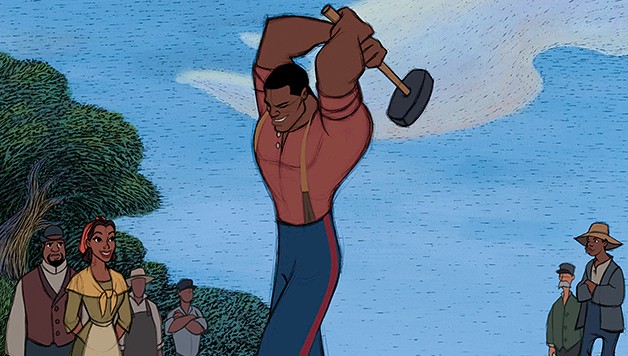I had originally planned to post today about Return From Witch Mountain, to pair with last week’s article about Escape to Witch Mountain. A nice parallel. However, when this column actually falls on Juneteenth, it seems only appropriate to write about one of Disney’s handful of attempts to connect with black culture and heritage. And I’ve already done The Princess and the Frog. Because I love that movie. But a few years earlier, they made a short about one of the few black figures in American folklore.
The story of John Henry (Geoffrey Jones) is a simple one. He is a steel-driving man. Born with a hammer in his hand. Et cetera. This version of the story gives him a bit of personality and a wife (Alfre Woodard), but it’s all building up to the same moment, where he challenges the steam drill to a race and dies of it. It’s honestly kind of hard to drag a summary paragraph out much longer than this, not least because it’s a story that has been sung for well over a century and even appeared on the third episode of The Simpsons.
But as is often the case, there’s more to this than just the story. For one, I really like the art. It does, honestly, have a certain crudity at times—the lines used to draw people’s faces have been animated as well as the faces themselves. But given how animation works, we know this to be a stylistic choice. More to the point, though, it’s very clearly intended to resemble quilting in its imagery, and as the daughter of a quilter, that makes me really happy. And, of course, the intersection between folk heroes and folk art is a good place to be, especially since it’s accepting black people into this folk tradition.
What’s more, this is, okay, yet another Dead Parent Story, but one where it makes it clear that there is still heritage and continuity possible even if the physical person who is the parent is not present. So the only two Disney animated works I can think of with a black protagonist end up being Dead Parent Stories; it’s true that slavery and Jim Crow left a hard legacy for black families. But this is Disney; dead parents are less common than living ones, and those two works are also some of the only ones I can name where the dead parent is discussed again afterward.
Okay, so spoilers, really. It turns out the story is being told to John Henry’s son. And maybe what he’s being told is legend and maybe it’s true; it’s worth noting that, in the real world, there are no fewer than three sites that all claim to be the “historical” location of the famous duel. There are a few folk heroes in the US who are people better at doing some job or another than anyone else, and it’s interesting how many of them involve the coming of a machine that would make their job obsolete. One wonders what versions of the concept our great-grandchildren will tell someday.
I actually wrote this without being able to rewatch the short specifically for it, because my internet went out until just before the article was due; support my drive for physical media by contributing to my Patreon or Ko-fi!

